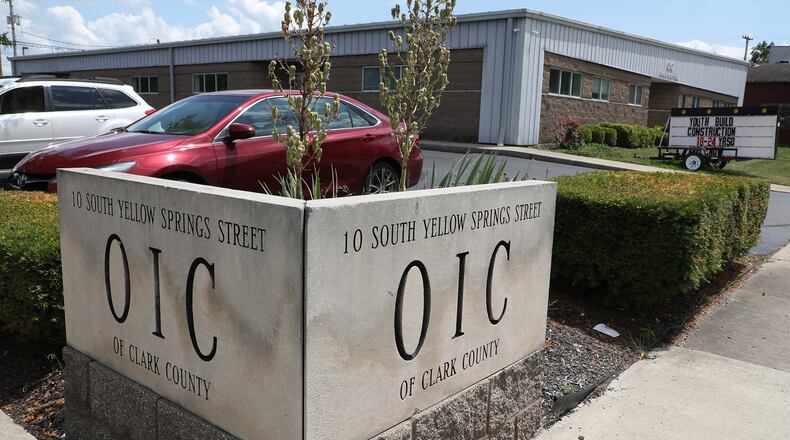OIC will use its Ohio Department of Development funds to pay Sheltered Inc. on a per head and per family basis to allow it to continue operations, Calabrese said.
Elaina Bradley, executive director of Sheltered Inc., said OIC will refer individuals and families experiencing homelessness to Sheltered Inc. and reimburse the organization for its services.
“Ultimately, the goal is to evolve and strengthen the partnership and the collaboration so we can implement methods to best address the critical needs of those families and children and individuals experiencing homelessness to ensure that we have safe and appropriate emergency housing,” Bradley said.
Sheltered Inc. will use Clark Schaefer Hackett accounting services to help manage the funds, Calabrese said.
Clark County officials said the February termination of a portion of a $700,000 contract — of which about $495,000 was reimbursed — with the organization happened after “multiple violations” in regards to the reimbursement of funds were found following a review.
Prevention, Retention and Contingency, or PRC, is a program through Ohio DJFS that provides work support and other services to low-income families. This program is funded through the Temporary Assistance for Needy Families (TANF), a federally funded program.
“The most glaring [issue] was the lack of proper [Prevention, Retention and Contingency] applications for recipients of services,” wrote Clark County DJFS director Ginny Martycz in a memo asking the county to terminate its contract. “Additionally, it appears there were requests for reimbursement for items paid for by other funding sources.”
Partners provide help
Since the nonprofit Sheltered Inc.’s contract was ended in February, one of its two emergency shelters was closed, staffing was reduced, services at low-income Woodford Apartments were ended and the remaining emergency shelter is closed from 8 a.m. to 8 p.m. daily instead of being open for 24 hours.
Bradley said in addition to the Salvation Army having a drop-in center on Tuesdays and Thursdays from 1 to 3 p.m. where people can play games, listen to music, socialize and eat a hot meal, the Victory Faith Center is providing similar services on Mondays, Wednesdays and Fridays from 1 p.m. to 3 pm.
Victory Faith Center Pastor Pauline Hamblin said the church will offer a light lunch and cool place to hang out during these times. She said it also offers “fellowship meals” on Saturdays and Sundays from noon to 1 p.m., and a “free store” where people can get hygiene and other products on the third Saturday of each month.
“We’re trying to be an extension of God’s hands into our community,” Hamblin said.
While the emergency shelter is closed for 12 hours each day, Sheltered Inc. is doing its best to work with its community partners to make sure everyone who needs these kinds of services gets them, Bradley said.
Numbers will increase
As of Wednesday, Sheltered Inc. is housing 25 people in its emergency shelter but this number changes constantly as more people come in and others transition to more permanent arrangements after getting back on their feet with the aid of the nonprofit’s housing, provision of food and case management, Bradley said. It has the capacity to house 36 at a time.
Bradley said more people than ever before are at risk of becoming homeless as the prices of rent and other basic necessities increase, so being able to provide a place for people in crisis to stay is crucial now.
“We’re going to see our numbers continue to increase, and as we have additional emergency shelter units continue to be taken away — our community is not in a position to not have the the available resources to not have a safe place to go for temporary housing,” Bradley said.
The face of the homeless
The Springfield City Commission in April approved an up to $1.34 million agreement with Dayton-based nonprofit Homefull to provide housing, health, access to food, employment resources and more, a deal initially intended to go to Sheltered Inc.
The city plans to use the Executive Inn site as a non-congregate shelter while it brings the Villager Inn space back online. The temporary shelter will then be phased out, according to the city.
The county last week approved a similar agreement with Homefull, allocating $350,000 of TANF funds to help the organization provide emergency shelter and case management in Clark County for one year.
Calabrese said the OIC agreement with Sheltered Inc. ensures that more people have a place to go and will help OIC, which spent $400,000 last month mostly on rental assistance to mitigate the crisis in the county. He said when the Executive Inn opens, there still will not be enough places for people to go, so everything organizations can do right now is critical.
“When you think about the face of the homeless person, because of media — TV, movies — the face generally looks like some long-haired white guy strung out on crack and heroin living underneath a bridge; that’s not the look at all,” Calabrese said. “These are young families, young women with children who are destitute. They do need case managed, they need all the help they can get.”
About the Author

